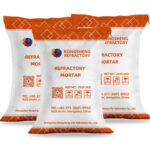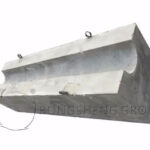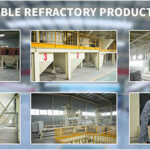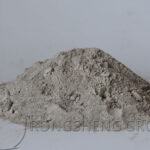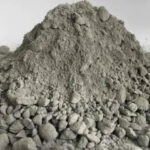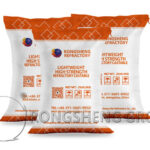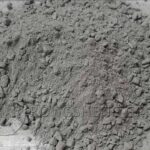Generally, the use of silicon carbide refractory mortar is a refractory mortar for building silicon carbide bricks, in addition to the high refractoriness, good workability, high bonding strength, and good volume stability that general refractory mortar should have. It should also have resistance to molten metal penetration, resistance to alkali corrosion, high thermal conductivity, and low thermal expansion. In addition, some parts of masonry also require high low-temperature baking bonding strength, and high-temperature baking bonding strength does not decrease.
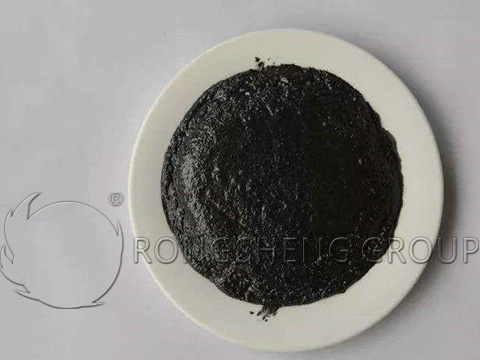
Commonly Used Silicon Carbide Refractory Mortar
At present, the silicon carbide refractory mortar used in the construction of silicon carbide bricks has a low content of silicon carbide in its aggregate (weight% <70%). This kind of refractory mortar has poor resistance to molten metal penetration and alkali corrosion, and a large amount of water is added during construction to obtain good construction performance. This results in a large amount of water vapor during the drying process, which is not conducive to the operation of the kiln. Although some manufacturers use organic matter and furan resin as the binder of refractory mortar, the content of silicon carbide in the aggregate composition of refractory mortar is lower, only 10% to 25%. Although, as refractory mortar for building silicon carbide bricks, it cannot meet the requirements in terms of resistance to molten metal penetration and alkali corrosion.
Silicon Carbide Refractory Mortar with High Bonding Strength
A refractory company provides a carbonized silica gel sludge, which aims to avoid the generation of a large amount of water vapor during the oven. Non-aqueous air-hardening silicon carbide refractory mortar with high bonding strength during low-temperature baking and higher bonding strength during high-temperature baking.
The non-aqueous air-hardened silicon carbide refractory mortar is composed of aggregate and binder, and its specific chemical composition is 76~86% aggregate and 14~24% binder. The chemical composition of aggregate is 67~79.9% SiC, 10~15% AL2O3, 5~10% C, 0.5~3% MgO. The chemical composition of the binder is 30-50% phenolic resin, 10-15% phosphate, and 35-55% ethylene glycol.
The aggregate contains 0.5%~3% MgO, and the binder contains 10%~15% phosphate. Their role is to improve the low-temperature bonding strength of silicon carbide refractory mortar. For example, in a 160℃X24h oven-drying, the bonding strength of refractory mortar is generally between 1 and 3 MPa. The non-aqueous air-hardening refractory mortar has a bonding strength greater than 6MPa, which is especially suitable for laying various types of silicon carbide bricks.
The thermosetting phenolic resin is used in the binder, and the non-aqueous organic solvent ethylene glycol is added. The purpose is to avoid the excessive generation of water vapor in the oven after the kiln is built, which will affect the operation of the kiln and improve the high-temperature bonding strength. The aggregate contains 67%~79.9% SiC in order to improve the resistance to molten metal penetration, alkali corrosion, and CO corrosion of refractory mortar. In addition, the SiC content in the refractory mortar is increased to make the thermal conductivity and thermal expansion closer to the silicon carbide bricks. The aggregate contains 10% to 15% of AL2O3 and 5% to 10% of SiO2. The purpose is to make the refractory mortar form a ceramic bonding phase at high temperatures to improve the high-temperature bonding strength. For example, the bonding strength of this refractory mortar at 1300℃X3h>7MPa.
The Manufacturing Process of Silicon Carbide Refractory Mortar with High Bonding Strength
- Aggregate preparation. In the sand mixer, the various components of the aggregate are prepared according to their composition range. Mix carefully and put in a bag for later use. The maximum particle size of the various components of the aggregate is required to be <100 mesh.
- Preparation of binding agent. In a container, mix phenolic resin, phosphate, and ethylene glycol within its chemical range according to a certain ratio, mix and stir until uniform, and put it into the container for later use.
- Preparation of non-aqueous air-hardening refractory mortar. When in use, the aggregate and binder prepared in the above steps are added to the mortar mixer in a certain proportion before on-site construction. The silicon carbide refractory mortar is obtained by stirring until uniform.
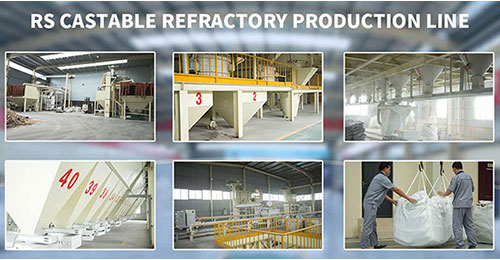
Buy Silicon Carbide Refractory Mortar from RS Manufacturer
Rongsheng is an experienced manufacturer of refractory materials. Buy silicon carbide refractory mortar with high bonding strength. Rongsheng’s advanced automatic monolithic refractory materials production line has an annual output of 80,000 tons. Our production line can undertake the production of unshaped refractory lining materials for various industrial kilns. Among our previous customers, we have provided them with high-quality wear-resistant and refractory plastics, refractory ramming mix materials, various high-strength refractory castables, and other monolithic refractories. If you need to buy refractory materials, please contact us. We will provide you with a free quotation according to your specific needs.

